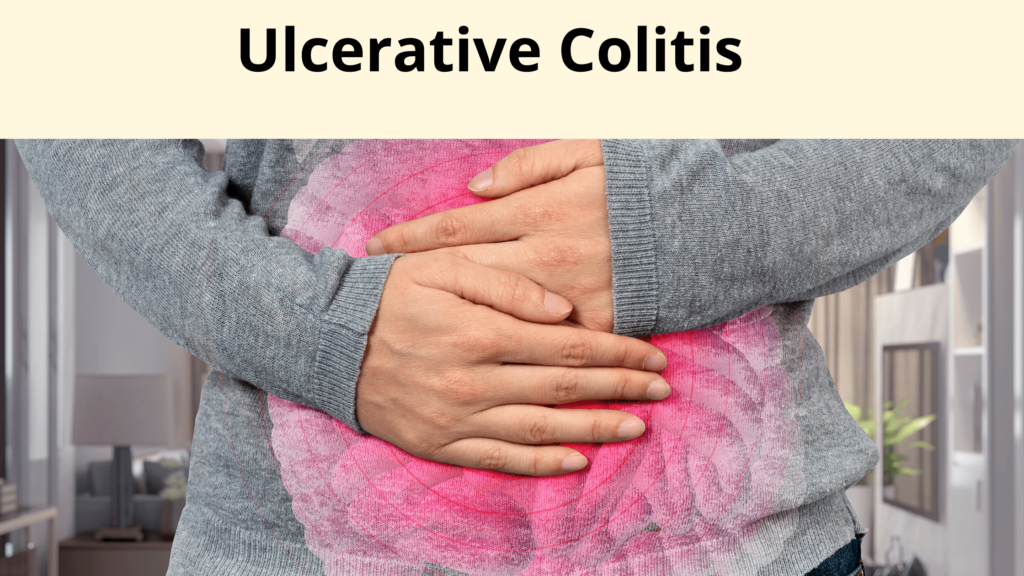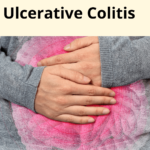Ulcerative colitis is a type of inflammatory bowel disease (IBD) that causes inflammation and ulcers in the digestive tract and affects the innermost lining of the large intestine (i.e., colon) and rectum. It causes diarrhea with blood, cramping, and urgency. It affects men and women equally, appears to be hereditary, and occurs in people of any age, but usually starts between 15 and 30 years and less frequently between 50 and 70 years of age.
Ulcerative colitis is classified according to its location and include:
- Ulcerative proctitis – inflammation of the area closest to the anus (rectum).
- Proctosigmoiditis – inflammation of the rectum and sigmoid colon.
- Left-sided colitis – inflammation that extends from the rectum up through the sigmoid and descending colon.
- Pancolitis – affects the entire colon.
Gastric Disorders
- Are you worried about a Peptic ulcer? Know the treatmentA peptic ulcer is an open sore. These ulcers develop… Read more: Are you worried about a Peptic ulcer? Know the treatment
- What is the scope of GI Surgery or Gastrointestinal Surgery?GI surgery or Gastrointestinal surgery includes various surgical techniques to… Read more: What is the scope of GI Surgery or Gastrointestinal Surgery?
- Irritable Bowel Syndrome (IBS)Irritable bowel syndrome (IBS) is also known as irritable colon,… Read more: Irritable Bowel Syndrome (IBS)
- Do you know what is studied under Gastroenterology?Gastroenterology is a branch of medicine that focuses on the… Read more: Do you know what is studied under Gastroenterology?
- Do you know Celiac Disease is an autoimmune disorder?Celiac disease is a digestive disorder that can damage your… Read more: Do you know Celiac Disease is an autoimmune disorder?
- Are you aware of the different types of Gastric diseases?Gastric diseases are diseases related to the stomach, intestine, liver,… Read more: Are you aware of the different types of Gastric diseases?
- What are the reasons for causing Abdominal Pain?What are the reasons for causing Abdominal Pain? Gastroesophageal reflux… Read more: What are the reasons for causing Abdominal Pain?
- How does Ulcerative Colitis affect our life and health?Ulcerative colitis is a type of inflammatory bowel disease (IBD)… Read more: How does Ulcerative Colitis affect our life and health?
What Causes Ulcerative Colitis?
- The exact cause of Ulcerative colitis is unknown.
- It is thought to be an autoimmune disease – the immune system misidentifies the healthy cells in the digestive tract as a threat and attacks them, leading to inflammation and bleeding.
- It is common in families where a member has the disease, suggesting heredity could be one of the possible causes.
What are the Risk Factors?
- The use of the drug isotretinoin (Amnesteem, Accutane, Claravis, or Sotret) to treat cystic acne has increased the risk of developing Ulcerative colitis.
- Age – UC usually begins before the age of 30, but it can occur at any age.
- Race or ethnicity – whites have the highest risk of the disease, though it can occur in people form any race.
- Family history – there is a higher risk if a close relative, such as a parent, sibling, or child, has the disease.
Ulcerative Colitis: Signs and symptoms
Depending on the severity and site of inflammation, signs and symptoms may include:
- Abdominal pain and cramping
- Diarrhea, often with blood or pus
- Rectal pain
- Rectal bleeding leading to anemia
- Urgency to defecate
- Inability to defecate despite urgency
- Weight loss
What are the Complications?
- Severe bleeding
- A hole in the colon – Perforated colon
- Severe dehydration
- Osteoporosis
- Inflammation of the skin, joints, and eyes
- Increased risk of colon cancer
- Toxic megacolon
- Rupture of the colon
Diagnosis: How to diagnose Ulcerative Colitis?
- Medical history – Check for symptoms and other risk factors.
- Physical examination – to check for abdominal tenderness, fever, inflammation of the iris and uvea, skin rash, inflammation of the joints, aphthous (benign) ulcers, and clubbing of the fingers. Are you worried about a Peptic ulcer? Know the treatment
- Diagnostic tests – The tests performed are:
- Blood tests – to check for anemia or signs of infection
- Stool cultures – to check for white blood cells or specific proteins in stool that can indicate UC.
- Endoscopic procedures like Colonoscopy, Flexible sigmoidoscopy, etc., to check for abnormality in the colon.
- Imaging procedures – CT scans, MRI scans X-rays, Computerized tomography (CT) enterography and magnetic resonance (MR) enterorrhaphy, etc.
Read Diagnosis and Screening for Gastric Conditions
Treatment: How is the Ulcerative Colitis treated?
- Surgery: proctocolectomy involves removal of the entire colon and rectum. Read more: What is the scope of GI Surgery or Gastrointestinal Surgery?
- Medications: Following medications are used:
- Anti-inflammatory drugs like 5-aminosalicylates [e.g., sulfasalazine (Azulfidine), mesalamine (Asacol HD, Delzicol, others)] and Corticosteroids 9e.g., prednisone and budesonide).
- Immunosuppressant drugs like Azathioprine (Azasan, Imuran), mercaptopurine (Purinethol, Purixan), Cyclosporine (Gengraf, Neoral, Sandimmune), Tofacitinib (Xeljanz).
- Biologics (e.g., Monoclonal antibodies) – Infliximab (Remicade), adalimumab (Humira) and golimumab (Simponi), Vedolizumab (Entyvio), Ustekinumab (Stelara).
- Other medications – Anti-diarrheal medications (loperamide)., Pain relievers (acetaminophen), Antispasmodics, Iron supplements.
Prevention: Can we prevent it?
Prevention of disease –
- The following steps may help:
- Drinking water in small amounts throughout the day.
- Eating smaller meals throughout the day.
- Limiting the intake of high fiber foods.
- Avoiding fatty foods.
- Lowering the intake of milk if you’re lactose intolerant.
Living with the disease–
- Consult the doctor immediately if any signs and symptoms like bleeding are visible.
- Eat a low-fat diet.
- Take in more vitamin C.
- Eat more fiber.
- Take the medications as prescribed, even when you don’t have symptoms.
- Avoid skipping medications as this can lead to flareups and make the disease harder to control.
- The best way to manage ulcerative colitis is to regularly follow the treatment plan and talk to your healthcare provider. Are you worried about a Peptic ulcer? Know the treatment
Consult a Gastroenteroligst in India
- Dr. Nikhil Patil- Gastroenterologist at Fortis Hospital
- Dr. NIMISH SHAH- Gastroenterologist and Hepatobiliary Expert
- Dr. Aruna Bhave- Gastroenterologist at Fortis, Mumbai
- Dr. Satish Kulkarni-Gastroenterologist in Mumbai
- Dr. Suryaprakash Bhandari- Gastrosurgeon in Mumbai
- DR. MANANJAY PRASAD- Gastroenterologist at Paras HEC Hospital, Ranchi
- Dr. M.A Mir- Gastroenterologist at Artemis Hospitals, Delhi
- DR. M. A. HAI- Gastroenterologist at Paras HMRI Hospital, Patna
- Dr. Lalith Giglani- Gastroenterologist at Metro Hospital ;Gujarat
- Dr. Lokendra Kumar- Gastroenterologist at Kailash Hospital; Noida
When to see a doctor? :
It is wise to consult with a gastroenterologist immediately if observed any symptoms. The typical consultation fee for a gastroenterologist ranges from Rs. 500 to Rs. 1500 in India.










